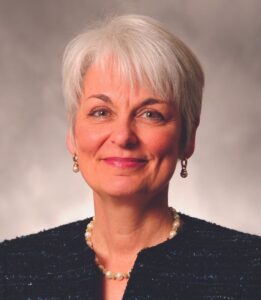Spotlight On: Laurie Hamen, Transitional President, College of Saint Benedict
Writer: Max Crampton-Thomas
 September 2021 — Laurie Hamen spoke to Invest: about how the College of Saint Benedict made it through the pandemic year by deploying a hybrid model of education. She also discussed the unique offerings in nursing and global business and how the school seeks to address the needs of the broader community.
September 2021 — Laurie Hamen spoke to Invest: about how the College of Saint Benedict made it through the pandemic year by deploying a hybrid model of education. She also discussed the unique offerings in nursing and global business and how the school seeks to address the needs of the broader community.
What are some of the biggest opportunities and challenges facing private colleges?
There are a number of really strong private colleges in the state of Minnesota and we’ve had a long-standing tradition of cooperating together as private colleges and universities. You can go to a lot of different types of private colleges, all of which are thriving and provide students value with tremendous, measurable outcomes. So we’re all different but we all cooperate. We’re always thinking about how we function in the complex world of higher education and the outcomes we want for students’ lives. How can we train individuals and develop their thinking skills so that if they choose to stay in Minnesota, which many of them do, they are top-notch thinkers and workers? I think that’s what the state expects of us and that is what we provide.
What are some changes students have come to expect from the college?
At Saint Ben’s and Saint John’s, we were in-person throughout COVID in the 2020-21 academic year. We had a high-flex option with a one-course-at-a-time schedule, so if you wanted to be at home or remote, for any length of time, you could dial or Zoom into your course. So we handled COVID differently from other institutions. But what we found was that our academic community — being face-to-face and with expert faculty and other students — is of supreme value to our institution. What I didn’t know was the intensity of that feeling among our students. They want to be here, on campus. COVID proved that. They want to study together and see their professor face-to-face. They want to be able to study abroad, develop an internship, volunteer, conduct research and have all of those experiential, academic opportunities. COVID absolutely made our mission of active learning, in community, come alive. Our students want academic and experiential learning, and they want to do it in a Benedictine environment of community.
How did your institution address the health crisis?
Health care was a matter of prime importance. Our health services increased dramatically over the time of COVID. Students coming in for tests and for contact tracing and having access to health care were all huge priorities for us. We hired new people, created new systems and new ways of communicating. All of that was essential in the pandemic. The same went for mental health. There were many individuals who needed mental health support. We invested in that as well.
What pre-professional programs do you offer?
We are a liberal arts college with a liberal arts curriculum, but we also have many programs through which students can immediately enter the workforce. We have a top-notch education program, a long-standing and excellent bachelor of nursing program and a large global business area, along with both accounting and economics. Even with all of these practical programs, we are liberal arts at our core. We have a Phi Beta Kappa chapter, a liberal arts curriculum and are committed to a spirit of free inquiry. I think we’re the best of both worlds in that way, we have programs that our community needs and wants and we develop thinking skills through a liberal arts curriculum that’s second to none. There are also some interesting hybrids, such as our data analytics program that is relevant and contemporary, yet squarely in the liberal arts.
What is the process when deciding which areas to pursue?
We’ve certainly done our research in terms of what is needed educationally in the community, but we never want to do only what is needed. We also assess faculty expertise to develop quality academic programs in a variety of areas. One example of a recent success is our new nurse practitioner program. There is tremendous expertise on our faculty in higher level nursing. We have a great undergraduate program, but could we go further? We certainly could. We hired a firm to help us understand the need for nurse practitioners and for master’s-trained nurses in our community. We found that the demand existed in our community specifically and that we had alumni support for that kind of program. When faculty expertise, resources and community needs come together, new and excellent academic programs are very likely to attract students and positively affect your community. We look for faculty expertise, the resources to do it right and community need for the services produced by our graduates.
What is your near-term outlook?
I think the outlook is extremely bright. We have alumni outcomes which are outstanding. I think about Saint Ben’s and Saint John’s graduates and about what they do for a living now: CEOs of many companies (including Fortune 100 companies like Best Buy), educational and health care leaders across the country, the U.S. secretary of veterans’ affairs, military leaders and entrepreneurs in great Twin Cities businesses. Graduates making a difference in their workplaces and in the community is what Saint Ben’s and Saint John’s are known for, and what is needed now more than ever before.
For more information, visit:













